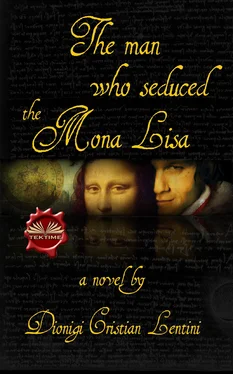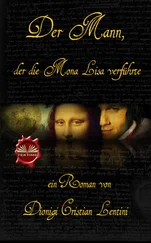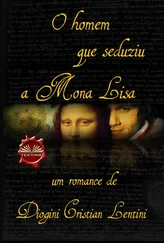he typed “ sinemensura” and there, like a pirate standing over his treasure chest, unfolded the most beautiful story he had ever read.
November 1482
The icy wind of that winter evening did not whip the battlements of the Castle of San Giorgio as much as the wind of passion raging in pulsating veins.
It was the month of November in the Year of our Lord 1482, Mantua was freezing, deserted… and Beatrice was lying on the bed in her room gazing dreamily at the imperial eagles on the ceiling… her mind was inundated with newfound imagination… unspeakable thoughts that, for a lady of her rank, brushed upon indecency. She knew that when the chatter of the Gonzaga servants disappeared from the noble floor, he, that charming diplomat now lord of her mind, would arrive, regardless of, if not profiting from, the reckless absence of her cousin and promised husband (the Marquis, with her father, had been fighting for two days beneath the walls of Ferrara strenuously defending the Este family, threatened by the Venetians of Count Roberto di San Severino).
In fact it happened that Girolamo Riario, the avaricious lord of Imola and Forlì, strengthened by the high patronage of his uncle Sixtus IV, having the declared objective of shortly taking possession of the Duchy of Hercules of Este, had managed to persuade the Doge of Venice of the need to wage war on Ferrara that had, for some time, been threatening the monopoly of the salt trade in the Polesine.
The d'Este family, were certainly more refined than military, and not casually related to the king of Naples (Ercole as they were linked by marriage to Ferdinando d’Aragona's daughter, Eleonora) and had been able to weave alliances with the neighboring Italian lordships, including that under Ludovico Maria Sforza known as “the Moor” (or “il Moro”), to whom the Duke of Ferrara had promised one of his daughters in marriage during unsuspecting times.
Thus the entire peninsula was soon divided against each other into two armed blocks: on the one side were the Papal States with Sixtus IV, Imola and Forlì with the Riario, the Republic of Venice, the Republic of Genoa, the Marquisate del Monferrato and the County of S. Secondo Parmense; on the other the Duchy of Ferrara under Ercole d'Este, the Kingdom of Naples under Ferdinando d'Aragona, the Duchy of Milan under Ludovico the Moor, the Marquisate of Mantua by Federico Gonzaga, the Duchy of Urbino with Federico da Montefeltro, the Lordship of Bologna ruled by Giovanni Bentivoglio and the Republic of Florence with Lorenzo de' Medici.
After the summer, the Venetian troops clearly held the advantage: they had conquered Rovigo, besieged Ficarolo, taken Argenta and now were also besieging Ferrara. The situation had become even more critical for the Este family since the most experienced leader of the anti-Venetian coalition had died from malaria in September: the notorious Federico da Montefeltro.
Unexpectedly, the pontiff, who in the meantime had defeated the Neapolitans at Campomorto, suddenly decided to put an end to the hostilities, negotiating with the king of Naples. Ludovico il Moro, in fact, working through diplomacy, had managed to convince the closest advisors of the Holy Father that the rapid expansion of the Serenissima in northern Italy was likely to be dangerous and would threaten both Milan and Rome; therefore, it would not at all convenient to anyone to continue that expensive war just to satisfy the mad ambitions of the Riario.
Too bad that Venice, one step away from final victory, obviously had no intention of giving up; rather it wanted to end the game, before winter turned even colder.
In fact, that afternoon the Lagunari, taking advantage of their opponents’ careless move, decided to launch a new attack from the north to the detriment of the garrison of Francesco Gonzaga, who was seeking a way to resist the opposing force of attack, concentrated more on defensive strategy and was completely unaware of what was about to happen in the incensed rooms of his beautiful palace…
Just two taps on the door: to the young lover it seemed that a bell had struck, like the heavy pendulum of her mind that now oscillated between extreme modesty and extreme audacity.
Not that peril the marquis scorned between the crossbows and arquebuses but the real courage it took to hold that key, to turn it and allow her lover to cross the threshold, the last bulwark of an already profaned heart.
As the fire in the hearth lengthened the shadow of the door that opened into the room, and the fearless knight entered, Beatrice turned abruptly, sensually dropping a pearl from her headdress onto the floor.
“Tell me it is not a sin,” she pleaded.
He slowly bent down to retrieve the pendant, encircled her hips and brushing her neck with his lips whispered the first and only sentence of that night:
“It certainly is. But not to commit it by wasting this moment would be even more so.”
In that instant she closed her eyes and unaware of the bitter news that would come from the battlefield the following day, she turned gently and indulged in passion. And while her promised one was humiliated by the Venetian cavalry, she, a rider in the saddle, exalted, free for one night to be herself.
So, when even the extreme clatter of swords in the field had ceased and the last log of wood in the room had been consumed, the new dawn did not rise to notify the increasingly imminent fall of Ferrara… but only yet another conquest by Tristano Licini de’ Ginni.
From Bergamo to Rome
Tristano was a distinguished twenty-two year old, brilliant, cultured and refined; his lean build and physical proportions permitted him to be thought of as “good-looking”; despite his youth, he was already an authoritative diplomat for the Papal States and, therefore, was well integrated into all the Italian courts. However, he did not have a fixed seat, from time to time the Holy See sent him on a mission to the Lordships of the peninsula (and not only), sometimes without the knowledge of the official ambassadors, for the most delicate, confidential, often secret matters. All the Lords and notables involved knew that talking to him was equivalent to conferring directly with the Holy Father, however he had no noble title, no one knew his past, his name never appeared on any official document, he dressed far better than many counts and marquises but there were no decorations or insignia on his chest, he showed that he had almost unlimited available funds but he was not the son of any banker or merchant, he moved casually on the political chessboard but never left a trace, he wrote history every day but never appeared on any of its pages… he was everywhere and yet it was as if he didn't exist.
In his first three decades of life he had grown up in the province of Bergamo, bordering the territories of the Republic of Venice, where he had received a good cultural education and an unconventional sentimental and sexual education. His father had died when he was small and when he was not much more than an adolescent his mother also. He lived with his grandfather, an old and tired nobleman now in decay who, despite everything, always proudly boasted of a family of Federician origin who, at the time of the Crusades, had been related to members of Tuscan families as much as they had been decorated were now practically extinct; the elder, however, commanded a certain amount of respect in the village and in the countryside, which was also reflected on the very young Tristano. At school age he was entrusted into the care of first the Dominicans and then the Franciscans, where he immediately revealed a certain propensity for logic and rhetoric, although every Sunday morning he infuriated his religious tutors as he preferred the angelic vision of the arrival of the young novices in church to the study of the classics, Greek and Latin. Sometimes he was seen to be saddened, perhaps by the absence of parents, but he was never sullen; he had a lively but always composed temperament, seemed to be alert but was never impertinent and had a clean face that caused him to be well liked by everyone in the village, especially the ladies.
Читать дальше












